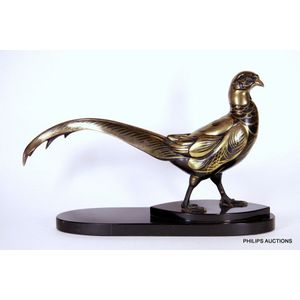Irenee Rochard Cold Painted Spelter Pheasant Figure
You must be a subscriber, and be logged in to view price and dealer details.
Subscribe Now to view actual auction price for this item
When you subscribe, you have the option of setting the currency in which to display prices to $Au, $US, $NZ or Stg.
- Cold Painted - This is term applied to so-called "Vienna bronzes" manufactured in that city starting in late part of the 19th century, and it continued in the early 20th century, but was also used by sculptors working in other areas of Europe at the time..
Traditionally bronzes are finished by treating them with various acids and chemicals and heats, and the patina is incorporated into the surface of the piece.
A cold-painted bronze is decorated with oil paints. The color was not fired, hence the term "cold painted". Reputedly the painting was carried out mainly by women working at home, a typical cottage industry. - Circa - A Latin term meaning 'about', often used in the antique trade to give an approximate date for the piece, usually considered to be five years on either side of the circa year. Thus, circa 1900 means the piece was made about 1900, probably between 1895 and 1905. The expression is sometimes abbreviated to c.1900.
- Navette - Navette, the French word for (weaver's) shuttle, means shuttle shaped, and is used to describe shapes in jewellery, ceramics and silver.
- Spelter - Spelter was the name given to an alloy of zinc and brass or copper used in the 19th century for statuary and lighting. It is a brittle bluish-white metal. It was used as a cheap replacement for bronze, but being brittle easily breaks and can't be repaired. When finished it can often be mistaken for bronze, but if discreet a scratch on the base displays shows a greyish colour, the metal is spelter, if a golden colour the metal is most likely bronze.
This item has been included into following indexes:
Visually similar items

Chinese enamelled rooster figure possibly silver, mounted on a wire inlay timber carved stand, height including stand 17.5 cm

English hallmarked sterling silver George III ewer with raised floral design. London, 1790, maker Hester Bateman height 14.5 cm weight 81.5 cm

A small Chinese bronze 'Duck' incense holder and cover, Kangxi period (1662-1722) or later. Depicted with one leg raised, and a few ruffled feathers on the lid, on a rounded plinth with wave design, 26 cm high

An Australian silver plated emu egg ewer inscribed 'Presented to Mrs. Cameron by Members of the Mildura Recreation Club, April 5th 1910', 34 cm high
